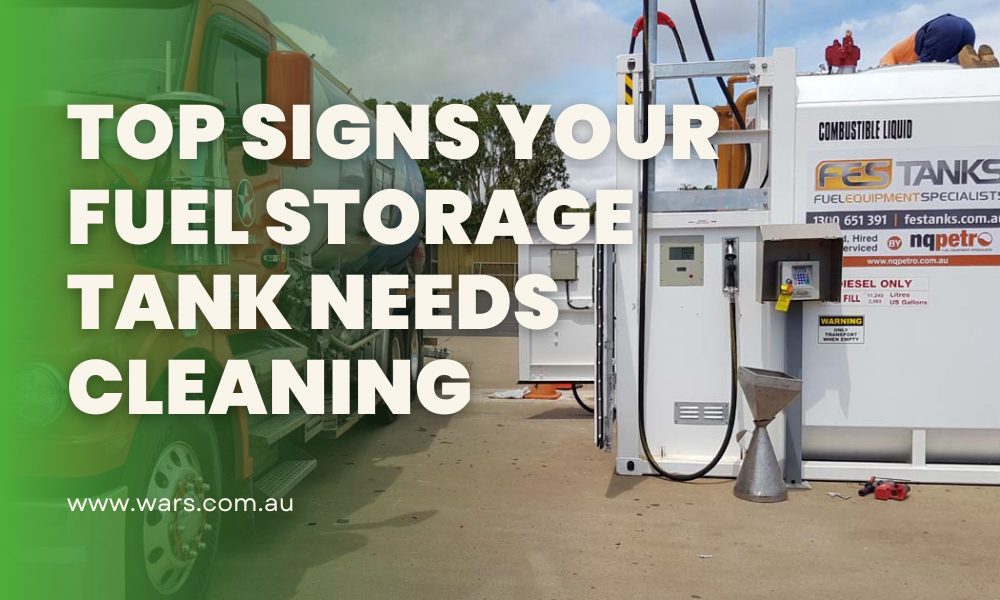
Maintaining your fuel storage tank properly is crucial for the efficient operation and longevity of your storage system. Over time, contaminants such as dirt, rust, and sediment can accumulate inside the tank, potentially causing various issues.
Recognising the signs that your fuel storage tank needs cleaning can help you avoid expensive repairs and ensure smooth operation. Here are the top signs to watch out for:
1. Decreased Fuel Delivery Efficiency
One of the early indicators that your fuel storage tank needs cleaning is a noticeable decrease in fuel delivery efficiency. When sediment or debris build up in the tank, it can clog filters and valves, reducing the flow rate and causing delays in fuel delivery. This inefficiency can result in increased operational costs and downtime.
2. Visible Sediment or Water Accumulation
During routine inspections or when checking the tank’s condition, look for any sediment, dirt, or water accumulation at the bottom of the tank. These contaminants can enter the fuel system and cause blockages or flow restrictions. Regularly cleaning the fuel storage tank helps remove sediment and water, ensuring clean fuel delivery and preventing damage to equipment.
3. Corrosion and Rust
Rust and corrosion inside the fuel storage tank can compromise its structural integrity over time. This is especially true for older tanks or those exposed to harsh environmental conditions. Corrosion weakens the tank walls and can lead to leaks, posing safety hazards and environmental risks. Cleaning and inspecting the tank regularly can help identify and address corrosion issues early.
4. Fuel Quality Issues
If you notice changes in fuel quality, such as unusual odours, colour changes, or increased sediment in fuel samples, it may indicate contamination in the storage tank. Contaminated fuel can damage engines and equipment, leading to costly repairs and downtime. Cleaning the fuel storage tank and replacing contaminated fuel is essential to maintain fuel quality and prevent operational disruptions.
5. Equipment Performance Problems
Poor performance or frequent breakdowns of fuel dispensing equipment can be a sign of issues within the fuel storage tank. Contaminants or debris can clog filters, nozzles, or pumps, causing equipment malfunctions and reduced efficiency. Cleaning the tank and conducting regular maintenance on dispensing equipment ensures reliable operation and extends equipment lifespan.
6. Fuel System Monitoring Alarms
Modern fuel storage systems are equipped with monitoring alarms that alert operators to potential issues such as leaks, low fuel levels, or system malfunctions. If you receive repeated alarms or notifications from your monitoring system, it may indicate the need for cleaning or maintenance of the fuel storage tank. Prompt action can prevent costly repairs and ensure continuous operation.
7. Regulatory Compliance
Adhering to regulatory requirements for fuel storage tank cleanliness and maintenance is essential for environmental protection and legal compliance. Regular cleaning and inspection of the tank help meet regulatory standards and prevent fines or penalties for non-compliance. Documenting cleaning activities and maintaining records demonstrates diligence in managing fuel storage facilities.
8. Fuel Consumption Anomalies
Unexpected fluctuations in fuel consumption rates or inconsistent fuel level readings can signal problems with the fuel storage tank. Contaminants or blockages can affect fuel flow and accuracy of fuel level monitoring systems, leading to inaccurate consumption data. Cleaning the tank and ensuring proper calibration of monitoring equipment helps maintain accurate fuel usage records and operational efficiency.
9. Odour or Vapour Issues
Strong odours or noticeable vapours around the fuel storage tank area can indicate fuel leakage or evaporation due to tank integrity issues. Leaks can be caused by corrosion, mechanical damage, or seals that have degraded over time. Regular cleaning and inspection of the tank help identify and repair leaks promptly, preventing environmental contamination and safety hazards.
10. Recommended Maintenance Schedule
To prevent the issues listed above, adhere to recommended cleaning and maintenance schedules specified by tank manufacturers or industry standards. Regular cleaning removes accumulated contaminants, prevents operational disruptions, and extends the lifespan of the storage tank and associated components.
Essential Fuel Tank Cleaning for Peak Performance with WA Refuelling
Regular inspection and maintenance of your fuel storage tank are essential for ensuring optimal performance, reliability, and safety of your storage system. By recognising these top signs that your fuel storage tank needs cleaning, you can take proactive steps to address potential issues before they escalate.
Whether you’re dealing with decreased fuel delivery efficiency, equipment malfunctions, or fuel quality concerns, timely cleaning and maintenance will help keep your fuel storage system operating smoothly. Incorporate these practices into your routine maintenance schedule to maximise the longevity and efficiency of your fuel storage tank and ensure uninterrupted fuel delivery in Perth, WA.
For professional assistance with fuel storage tank cleaning services in Perth, WA, contact us on (08) 9359 1988 today. Our expert team specialises in comprehensive fuel system solutions to meet your needs and ensure peak performance.
